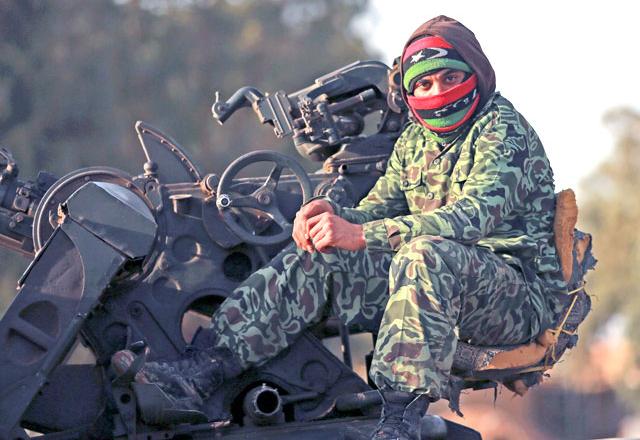You are here
Old loyalties, religious cohesion may frustrate Daesh in Libya
By Reuters - Apr 21,2015 - Last updated at Apr 21,2015

CAIRO — Daesh’s executions of Christians show the group is exploiting Libya's lawlessness but tribal and political loyalties and the absence of a sectarian divide mean it is unlikely to grow as rapidly there as in Iraq or Syria.
On Sunday, the militant group published a video purportedly showing the execution of 30 Ethiopian Christians in two locations in eastern and southern Libya, two months after it beheaded 21 Egyptian Copts there.
The video suggests Daesh, which controls much of Syria and Iraq, has managed to further expand in the North African country after establishing a limited presence in the eastern town of Derna as well as in western and central Libya.
It is benefiting from chaos in oil-producing Libya, where two governments allied to armed factions are fighting each other on several fronts four years after the fall of Muammar Qadhafi. With neither side able to dominate, a security vacuum exists.
But Daesh may struggle to expand as it has in Syria and Iraq because Libya has no Sunni-Shiite divide the group could exploit to draw in supporters. Libyans are Sunni Muslims.
The militant group also lacks strong ties to large Libyan tribes, and must compete with former anti-Qadhafi rebel groups that have carved out their own fiefdoms based on regional, tribal, ethnic and political ties.
"These groups are ultimately self-serving and self-interested," said Geoffrey Howard, Middle East and North Africa analyst at Control Risks.
"IS's [Daesh’s] advances are likely to pose a threat to their own political and economic agendas, as well as their control over territory and strategic assets."
That has left Daesh splintered into small units that can launch high-profile attacks but whose grip on territory is not firm enough to build up social services, as the group has done to win over local people in places like Iraq's Mosul.
Unlike in Iraq and Syria, Daesh insurgents have not occupied any oilfields in Libya to generate revenues, and selling oil outside official channels would anyway be more complicated in Libya than in the two other Arab countries.
With oil storage facilities located in coastal areas, Libyan oil is exported by sea. Some Libyan warring factions have tried to sell oil independently from ports under their control but a UN embargo has deterred foreign shippers.
Cross-border oil smuggling would also be difficult as Daesh controls no Libyan land border.
Foreigners joining
Videos showing executions and portraying Christians as "crusaders" could help Daesh attract more fighters from abroad or from local militant groups such as Ansar Al Sharia.
"They want to send a signal to Libyan jihadists that they are the really tough guys," Mattia Toaldo, policy fellow at the European Council on Foreign Relations, told the Reuters Global Oil Forum. "The attraction of Tunisian and Sudanese jihadists gives Islamic State [Daesh] a big potential."
But the biggest security headache for Western powers would be a Daesh expansion into Libya's southern Sahara, the apparent location for part of Sunday's video.
Neither Libyan government holds much sway in the remote area bordering Niger, Chad, Sudan and Algeria, which has been long neglected. Qadhafi made local tribesmen promises of citizenship and development projects but never delivered.
Southern tribes make a living by smuggling anything from subsidised petrol, flour and weapons to African emigrants heading for Europe across Libya's porous sub-Saharan borders.
In January, Daesh posted a recruitment video in a Tuareg language, calling on aggrieved tribesmen to join with their promised “caliphate”.
Analysts say recruiting in the south would help Daesh co-operate with other militant groups, such as Tuaregs fighting in Mali or Nigeria's Boko Haram as it tries to take its battle to Libya's neighbours Chad and Niger.
The militants also benefit from the reluctance of Libya's warring governments to tackle them, analysts say, as each wants Daesh to keep the other busy.
War planes belonging to the internationally recognised premier Abdullah Al Thinni have made air strikes near the central city of Sirte on forces loyal to the rival government, which controls Tripoli. But they have spared militants inside Sirte, where Daesh has taken over government buildings.
Forces loyal to Tripoli have meanwhile moved heavy guns to the outskirts of Sirte but not launched a full assault on the Islamists fighting Thinni's forces in the east, although there have been smaller clashes outside the city.
While Thinni misses no opportunity to warn about Daesh’s expansion, Tripoli officials tend to downplay the group as Qadhafi loyalists with little power.
"The terrorist groups cannot terrorise the main cities. They only sneak into small towns," said Amina Mahjoub, an Islamist member of the Tripoli-based rival parliament.
Related Articles
Ten fighters loyal to the self-proclaimed government that controls Tripoli were killed by Daesh militants in central Libya on Wednesday, officials said.
Gunmen possibly linked to Islamist militants assaulted and seized control of a Libyan oilfield, killing and kidnapping several workers, Libyan and foreign officials said on Wednesday.
Militants claiming loyalty to Daesh terror group said they were behind Sunday's twin bomb attacks on the residence of the Iranian ambassador in the Libyan capital and a rocket strike on the eastern Labraq Airport, the group said in a statement.
















